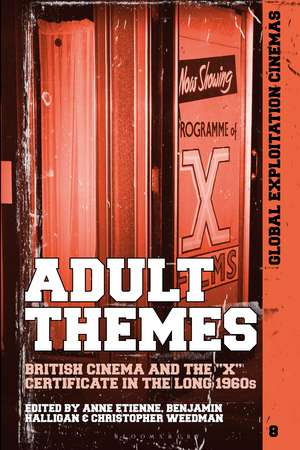Adult Themes: British Cinema and the X Certificate in the Long 1960s: Global Exploitation Cinemas
Editat de Anne Etienne, Dr. Benjamin Halligan, Christopher Weedmanen Limba Engleză Hardback – 20 sep 2023
Preț: 538.77 lei
Preț vechi: 773.09 lei
-30% Nou
Puncte Express: 808
Preț estimativ în valută:
103.13€ • 112.06$ • 86.68£
103.13€ • 112.06$ • 86.68£
Carte disponibilă
Livrare economică 31 martie-14 aprilie
Preluare comenzi: 021 569.72.76
Specificații
ISBN-13: 9781501375279
ISBN-10: 150137527X
Pagini: 264
Ilustrații: 15 bw illus
Dimensiuni: 152 x 229 x 25 mm
Greutate: 0.45 kg
Editura: Bloomsbury Publishing
Colecția Bloomsbury Academic
Seria Global Exploitation Cinemas
Locul publicării:New York, United States
ISBN-10: 150137527X
Pagini: 264
Ilustrații: 15 bw illus
Dimensiuni: 152 x 229 x 25 mm
Greutate: 0.45 kg
Editura: Bloomsbury Publishing
Colecția Bloomsbury Academic
Seria Global Exploitation Cinemas
Locul publicării:New York, United States
Caracteristici
Includes case studies of film censorship involving lesser-known (or, in other instances, unexplored aspects of well-known) "adults only" British films and their film-makers
Notă biografică
Anne Etienne is Lecturer in Modern and Contemporary Drama at University College Cork, Ireland, and her research focuses on theatre censorship and Arnold Wesker. Benjamin Halligan is the Director of the Doctoral College of the University of Wolverhampton, UK, and his research focuses on film history, music and media, and critical theory. Christopher Weedman is Assistant Professor of English at Middle Tennessee State University, USA, where his research focuses on mid-twentieth century British and American cinema.
Cuprins
Acknowledgements List of illustrations Introduction: 'Passed As Only Suitable for Exhibition to Adult Audiences: X'Anne Etienne (University College Cork, Ireland), Benjamin Halligan (University of Wolverhampton, UK), and Christopher Weedman (Middle Tennessee State University, USA) 1. Green Penguin FilmsKim Newman (Independent Scholar) 2. The Commercial Idealism of Controversial Cinema: Raymond Stross and the Censorship of The Flesh Is WeakChristopher Weedman (Middle Tennessee State University, USA) 3. Colour, Realism and the X Certificate: Horrors of the Black Museum and Peeping Tom Sarah Street (University of Bristol, UK) 4. Mediating Desire: Karel Reisz's Adaptation of Saturday Night and Sunday Morning Simon Lee (Texas State University, USA) 5. Lolita, Censorship, and Controversy: The Archival Remains of the Dispute Between Canon L. J. Collins and Stanley Kubrick James Fenwick (Sheffield Hallam University, UK) 6. Paternalism, Bohemianism, and the X Certificate: The Party's Over and the Pre-Swinging SetKevin M. Flanagan (George Mason University, USA) 7. Mediatising Modernity: Femininity in the X-Rated Swinging London FilmMoya Luckett (Texas State University, USA) 8. What Are the X-Rated Secrets of the Windmill Girls?Adrian Smith (Independent Scholar) 9. The Potent Sexuality of the Middle-Aged Woman: Alice Aisgill, Karen Stone, Zee Blakeley and RubyLucy Bolton (Queen Mary University of London, UK) 10. Censoring Carmilla: Lesbian Vampires in Hammer HorrorClaire Henry (Massey University, Aotearoa New Zealand) 11. 'The horror film to end all horror films': 10 Rillington Place and the British Board of Film Censors' Shifting Policy on True CrimeTimSnelson (University of East Anglia, UK) 12. Class and Classification: The British Board of Film Censors' Reception of Horror at the Time of the Festival of LightBenjamin Halligan (University of Wolverhampton, UK) Contributors Index
Recenzii
Adult Themes offers a full range of fascinating insights into Britain's film culture across the long 1960s, specifically the deployment of the X certificate as a means of mapping previously uncharted territory in an increasingly permissive social climate. Taking in such varied films as Peeping Tom, The Party's Over, Secrets of a Windmill Girl, 10 Rillington Place and Zee and Co, made and released during John Trevelyan's liberalised leadership of the British Board of Film Censors, the twelve chapters (plus a thoughtful editors' introduction) provide new perspectives on how films of this era responded to, mediated, and sometimes anticipated attitudinal change - or directly challenged the status quo - by means of the new possibilities granted to them by the 'X'. Highly recommended reading for those interested in British cultural history, the Sixties, censorship and regulation, and the always contested cinematic terrains of sex and violence, crime and horror.
I well remember the British X certificate and how I sneaked into my first one -- Circus of Horrors (1960) -- in those distant days of yesteryear. These co-editors and their contributors have performed an indispensable job in covering such a wide area and providing information that will form indispensable reading for generations to come. Well-researched, expertly written in clear and concise ways and attuned to significant issues of culture and history, this will become a definitive work in this area for years to come.
I well remember the British X certificate and how I sneaked into my first one -- Circus of Horrors (1960) -- in those distant days of yesteryear. These co-editors and their contributors have performed an indispensable job in covering such a wide area and providing information that will form indispensable reading for generations to come. Well-researched, expertly written in clear and concise ways and attuned to significant issues of culture and history, this will become a definitive work in this area for years to come.








